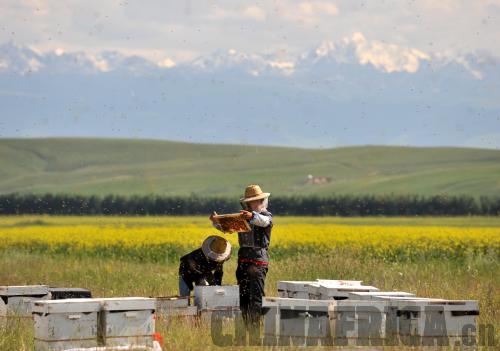|
 |
|
BUZZING: China is the world's biggest honey producer (JIANG WENYAO) |
African honey
When the second ApiExpo Africa 2010, the most important event for the continent's honey sector was held in Zambia's capital, Lusaka, on October 26-29, last year, few Chinese people knew about it.
The honey brands Chinese consumers favor are those from South Korea, Canada and New Zealand.
"Frankly speaking, I never heard of African honey," Xie told ChinAfrica. "Neither did any of my friends."
However, African honey has its own reputation. According to ApiTrade Africa, a not-for-profit organization that quotes a market survey by the Center for BioInformatics (UK's top business lobbying organization) on honey, the EU accounts for nearly 20-25 percent of the world's honey consumption, of which 41 percent is imported from developing countries, including Ethiopia, Tanzania, Uganda, Zambia and Cameroon.
"African honey exporters from the five African countries approved for the EU market do not find difficulties trading with their European partners," said Robert Grace Kisenyi, Promotion Officer from ApiTrade Africa on the organization's website. "Instead the exporters say that their honeys are preferred because they are largely organic since most cultivated lands in Africa don't use chemicals. The residues of antibiotics, sulphonamides, pesticides and heavy metals are predictably non-existent in the honeys," he said.
Data from the Food and Agriculture Organization of the United Nations reveals that Africa's honey production accounts for about 12 percent of the world's total.
Zambia exported 1,000 tons of honey to the EU and the United States in 2010 and is projected to expand its honey industry five-fold in the next five years.
Quality counts
Is it possible to see African honey on Chinese shelves in the near future?
Lu Jiajun, whose family has been involved in beekeeping for three generations and owns a honey business in Conghua County, south China's Guangdong Province, told ChinAfrica that it's absolutely possible that Chinese customers would be interested in high quality organic honey from Africa.
"But how to convince people in the first place will be a tough challenge to African exporters," Lu said. This was due to some quality problems like honey adulteration by addition of fructose and glucose existing in China's domestic market, which left consumers worried about the quality of local and imported honey brands, but still willing to experiment.
"Only if I know enough to build up my confidence [toward the product], I'll try any honey, no matter where it is produced," said Xie. She added that compared with brand and quality reputation, the price factor is less important.
Shang agrees. She takes a foreign-made honey that is being sold at her supermarket as an example. The 500-gram jar sells at 199 yuan ($30.06), nearly four-fold of the high-grade Chinese-made honey, yet it is one of the fastest selling items in the store.
"The truth is high-end honey can easily find its target customers," said Shang.
Apart from trade possibility, industry experts also called for cooperation in the field of investment and technology.
Chen Lihong, a researcher from Apicultural Science Association of China, who visited Tanzania in 2004 to study that country's honey sector, believes that lack of technology and skills, inadequate marketing information and production scale are challenging the Africa's honey industry.
"In this context, I think aid or investment in the honey sector will be good projects we can work on in the future," Chen said. |